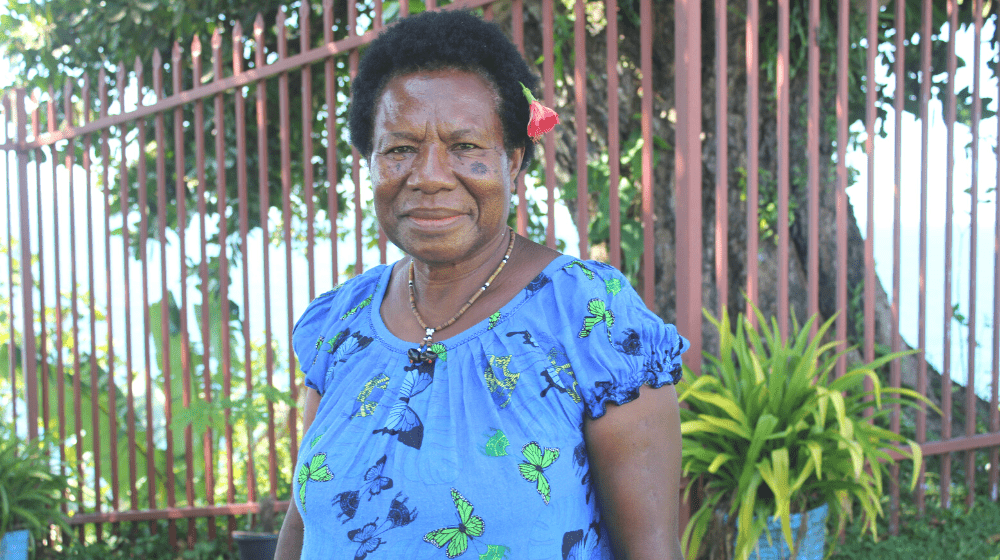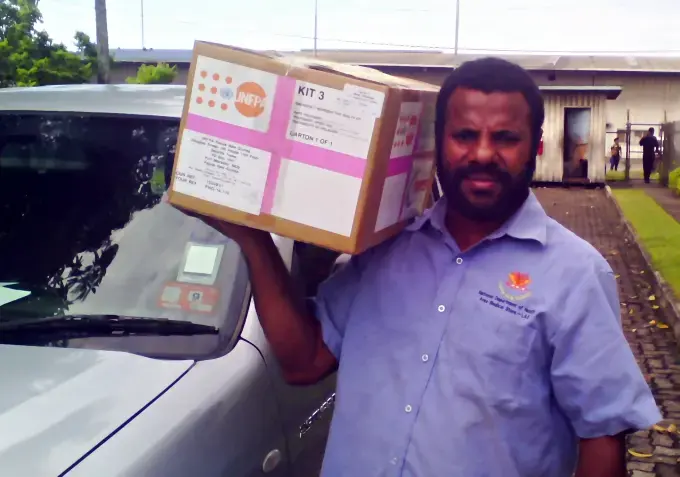“Oxytocin is a life-saving drug for women experiencing bleeding during delivery. It is not being kept in fridges and it just ends up expiring on the shelves because health care workers are not properly trained to manage medicines,” shared Judith Takura, Coordinator of Family Health and Services for East Sepik Provincial Health Authority. “Most of our health facilities are completely out of many reproductive health commodities.”
Trained as a nurse, Mrs Takura has 30 years experience in the health care sector in Papua New Guinea. She has seen the impact of routine medicine shortages and the lack of training in inventory management and planning.
Reproductive health commodities include medicines, devices, and equipment for a range of services from family planning to emergency obstetric and neonatal care.
Earlier this year, Mrs. Takura participated in the national Assessment for Reproductive Health Commodities and Services, conducted by the United Nations Population Fund (UNFPA) in partnership with the National Department of Health and with support from the Australian Government through the PNG-Australia Partnership. In this assessment, Mrs Takura surveyed 9 of the 52 health facilities in her province, including a range of primary and secondary health providers.
One of her takeaways was the need for training health care workers on the proper storage of medicines, including oxytocin, the correct way to dispense medicines, and also on addressing misconceptions surrounding the Emergency Contraceptive Pill and vasectomy.
“In surveying the Wambisa Health Center in Wosera-Gawi District, most of the Emergency Contraceptive Pills have expired because they have been sitting on the shelves unused,” said Judith. “According to the Health Workers, these ECP’s are only for rape cases and cannot be used for unprotected, consensual sex. They admitted that they are unclear as to the purpose of ECP.”
While emergency contraception is not recommended for regular use, all women and girls at risk of an unintended pregnancy have the right to access emergency contraception and health care providers should be well informed of its use and possible side effects.
A shelf of expired medicines is not only bad for patients. A healthcare facility that has spent money on medicines that are left to expire may not have the resources to purchase new stock. At a national level, there is a significant cost to allowing medicines to expire. Investing in training for health care workers and dispensary staff on the purpose, forecasting, storage, and management of inventory and expiry dates of essential medicines means better value-for-money for patients and the system.
World Contraception Day, 26 September, is an opportunity to reaffirm a woman’s right to plan the number, timing, and spacing of her children. Access to contraception is an integral part of her decision-making. According to a report by UNFPA Global, around 257 million women who want to avoid pregnancy are not using safe, modern methods of contraception. Of these women, 172 million use no method at all. In Papua New Guinea, the Demographic and Health Survey 2016-2018 found that one quarter of women have an unmet need for family planning, meaning they do not currently want to get pregnant but are not using any form of contraception.
UNFPA works to support family planning by ensuring a steady, reliable supply of quality contraceptives; strengthening national health systems; advocating for policies supportive of family planning; and gathering data to support this work.
Contraception can be a sensitive topic in PNG and most families often do not seek it for themselves unless suggested by health workers, usually after having children. There is also a misconception that family planning and contraception can only be administered to women, not to men. However, in East Sepik Mrs Takura says there are many men presenting to health care providers for a vasectomy.
“There is a long list of men across the nine facilities that I visited asking for a vasectomy,” she said. “In Maprik District Hospital, there are 25 men who are on this list.”
“However, this cannot be done because there is no skilled person in the province to do the procedure. There are no medical tools in the health facilities and it is an expensive exercise for them to seek this procedure in other parts of the country, ” said Judith Takura.
“This means there is an increased pressure on women to be on contraceptives and it (family planning) is not seen as a collective family decision.”
The East Sepik Provincial Health Authority are aware of this situation and are already arranging for vasectomy training for health workers across all 52 Health facilities commencing in 2023.
UNFPA and Reproductive Health Commodities
UNFPA works with the National Department of Health (NDoH) to address the unmet need for family planning and reduce maternal mortality and morbidity. Through support to midwifery in-service training and equipment, procurement and distribution of contraceptives and reproductive health commodities, support to the Certification in Basic Pharmaceutical Management course for Pharmacy Assistants, and sexual and reproductive health advocacy, UNFPA’s partnership with NDoH focuses on strengthening local expertise in delivering improved health services Papua New Guinea.
With support from the Australian Government, UNFPA has completed a national Assessment for Reproductive Health Commodities and Services to assess the availability and quality of essential reproductive health commodities and quality of family planning and maternal health services in primary, secondary, and tertiary facilities across the country.
In addition, UNFPA procured $730,000 USD of reproductive health commodities in 2022 with support from UNFPA Supplies and mobilized $260,000 USD for strengthening the supply chain and health system in PNG.



